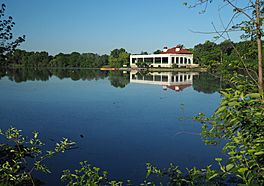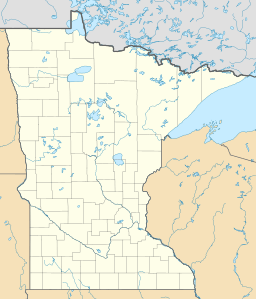Como Lake (Minnesota) facts for kids
Quick facts for kids Como Lake |
|
|---|---|

Como Lake and Como Lakeside Pavilion
|
|
| Location | St. Paul, Minnesota |
| Coordinates | 44°58′45″N 93°08′26″W / 44.97919°N 93.14050°W |
| Basin countries | United States |
| Surface area | 70.5 acres (285,000 m2) |
| Max. depth | 15.5 ft (4.7 m) |
| Water volume | 468.8 acre-feet (578,300 m3) |
Como Lake is a beautiful 70.5-acre (28.5-hectare) lake in St. Paul, Minnesota, United States. It is about 15.5 feet (4.7 meters) deep at its deepest point.
This lake, along with the nearby Como Park, has been a popular spot for fun for over 100 years. People from the Twin Cities area love to visit. A local farmer named Charles Perry gave the lake its name in 1848.
On the west side of Como Lake, you'll find a pavilion. This building hosts plays and music concerts when the weather is warm. The park also has other cool places to visit, like the Como Park Zoo and Conservatory and the Como Regional Park Pool.
Lake's Story
How Como Lake Changed
Como Lake was once mostly a wet, marshy area with some open water. It became bigger and deeper when Como Park was built around it. The lake gets its water from storm drains, which means rain runoff flows into it.
In the summer, the lake used to have many algae blooms. These are like thick green mats of tiny plants that can make the water smell bad. Visitors often complained about the smell.
Making the Lake Healthier
People have worked hard to make the lake water better. They replaced plants that didn't belong with native plants that naturally grow there. They also added special systems to filter the water. Sometimes, they used treatments like herbicides (to control unwanted plants) and alum (a chemical that helps clean the water).
Thanks to these efforts, there is less algae growing now. The water quality in Como Lake has really improved as of 2022.
Fish in the Lake
Como Lake is home to many different kinds of fish. If you go fishing there, you might catch:
- black bullhead
- black crappie
- bluegill
- golden shiner
- green sunfish
- Hybrid sunfish
- northern pike
- pumpkinseed
- walleye
- white sucker
- yellow bullhead
- yellow perch
Sometimes, there are special rules about eating fish from the lake. This is because some fish, like bluegill, bullhead, crappie, largemouth bass, northern pike, and walleye, might have small amounts of mercury or PFOS. These rules help keep people safe and healthy.
 | Delilah Pierce |
 | Gordon Parks |
 | Augusta Savage |
 | Charles Ethan Porter |


